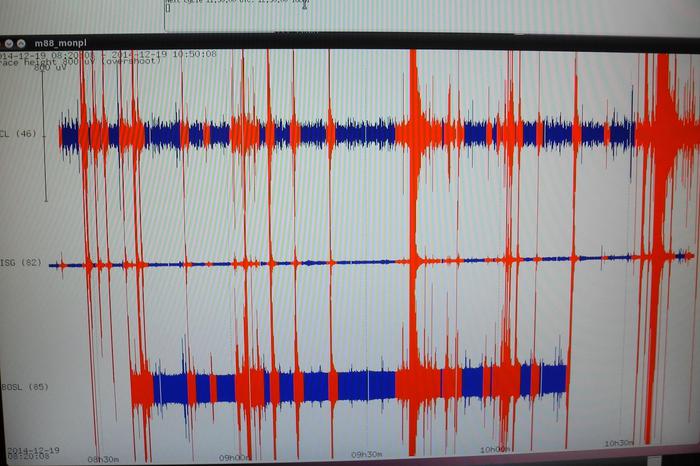The threat is considered this Sunday as over.
The tsunami caused by the powerful eruption of an underwater volcano in the Tonga Islands in the South Pacific Ocean caused significant damage but no casualties.
The Pacific Tsunami Warning Center (PTWC) said at 4 a.m. Paris time that the threat of tidal waves has "generally passed" for countries bordering the ocean, although slight variations in the sea level remain possible for a few hours.
"The tsunami had a significant impact on the northern coastline of Nuku'alofa", the capital of the Tonga Islands, "with boats and large rocks washing up on the shore," said New Zealand Prime Minister Jacinda Ardern.
She added that the extent of the damage is difficult to assess in the small Pacific kingdom since communications are cut.
"Nuku'alofa is covered in a thick cloud of volcanic ash, but otherwise the situation is calm and stable," added the head of government after contacting her country's embassy there.
Aerial reconnaissance Monday if the ash cloud allows it
Tonga needs a water supply, she added, because “the ash cloud has caused contamination. New Zealand will send a military reconnaissance aircraft to fly over the region on Monday if the volcanic ash cloud permits. Jacinda Ardern said there is "no significant eruption underway" and ash has stopped falling.
Stunning views from space showed the timing of Friday's eruption of Hunga Tonga-Hunga Ha'apai, on one of the archipelago's uninhabited islands.
A huge mushroom of smoke and ash forms and then a wave is immediately triggered.
Some 1.2m high swept over Tonga's capital, where residents said they had fled to higher ground, leaving behind flooded homes as rocks and ash fell from the sky.
Tonga's Hunga Tonga volcano just had one of the most violent volcano eruptions ever captured on satellite.
pic.twitter.com/M2D2j52gNn
— US StormWatch (@US_Stormwatch) January 15, 2022
The king of Tonga, Tupou VI, was evacuated from the royal palace of Nuku'alofa and taken to a villa far from the coast. The eruption triggered tsunamis in the Pacific, with waves of 1.74m measured in Chanaral, Chile, more than 10,000 km away, and smaller waves observed along the Pacific coast, the Alaska to Mexico. Waves of around 1.2m hit the Pacific coast of Japan. In California, the city of Santa Cruz was affected by flooding due to a tidal wave generated by the tsunami. Peru, where "abnormal waves" have been observed, according to Civil Defense, closed 22 ports as a precaution and the police said they had rescued 23 people on the coast, without specifying under what circumstances.
The Hunga Tonga-Hunga Ha'apai submarine volcano, located about 65 km from the Tongan capital Nuku'alofa, emerged during an eruption in 2009, and spewed so many large boulders and ash into the air in 2015 that a new island two kilometers long by one kilometer wide and 100 m high was formed when they were deposited.
A shock wave around the world, even in France
The United States Geological Institute (USGS) recorded Saturday's eruption as equivalent to a magnitude 5.8 earthquake at zero depth. It lasted eight minutes and sent plumes of gas, ash and smoke several miles into the air. New Zealand scientist Marco Brenna, a senior lecturer at the University of Otago's School of Geology, called the impact of the eruption "relatively small", but said another eruption with a much larger impact could not be ruled out. The eruption was so powerful it was even felt in Alaska.
Further afield, the weather station in Fife, Scotland, says it's 'simply amazing to think of the power that can send a shockwave around the world', after the eruption caused a jump in its atmospheric pressure graph.
While the wave had just reached Europe, the World Meteorological Organization (an offshoot of the United Nations) insists that this eruption “reminds us that we all share the same atmosphere”.
In Paris, the wave, which spread in all directions from the site of the eruption, arrived in two stages.
A first clear variation in atmospheric pressure was observed on Saturday between 8 p.m. and 9 p.m., a second in the night from Saturday to Sunday between 2 a.m. and 3 a.m.
🌋 The shock wave from the #eruption of the Hunga Tonga-Hunga Ha'apai #volcano in the #Tonga archipelago spread to #France yesterday evening with two clearly visible pressure variations on our station of #Paris Saint-Germain-des-Prés.
An unusual event!
pic.twitter.com/0kLUVtARRo
— Guillaume Séchet (@Meteovilles) January 16, 2022
The Met office, the British equivalent of Météo France, takes the image of a pebble thrown into the water to explain the phenomenon, supporting graphics of the two passages of the wave.
Our atmosphere acts as a fluid, like dropping a pebble in a still pond and seeing the ripples.
A UK pressure trace for the past 24 hours shows how our atmosphere continues to see those ripples since the first pressure wave from the #Tonga eruption arrived on Saturday evening.
pic.twitter.com/rr0xBONe4v
— Met Office (@metoffice) January 16, 2022
"Our atmosphere behaves like a fluid, similar to how a still pond reacts when a pebble falls into it and ripples form."
When the pebble is small, the waves dissipate fairly quickly;
when it is large, they last longer and spread over a greater distance.





